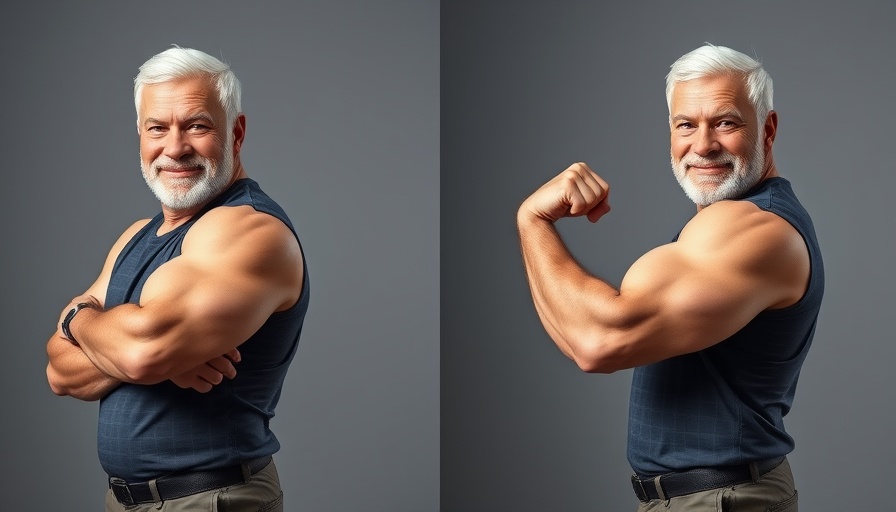
The Importance of Strength Training for Seniors
As we age, maintaining strength becomes crucial for overall health and independence. In the video "Why Seniors STAY WEAK & how to get STRONG Safely (According to Science)," Dr. Matt emphasizes that merely engaging in light activities like walking and yoga is not enough to ensure lasting strength. Instead, understanding and implementing structured strength training, particularly through the principle of progressive overload, is essential for seniors to thrive and reduce health complications.
In "Why Seniors STAY WEAK & how to get STRONG Safely (According to Science)," Dr. Matt sheds light on the key elements of safe strength training, urging us to explore deeper insights into effective strategies for seniors.
Understanding Progressive Overload: The Key to Successful Training
Progressive overload is a term that refers to gradually increasing the amount of stress placed on your body during exercise. This method is crucial because the body adapts to stress over time, gaining strength through consistent and appropriately challenging workouts. Dr. Matt clearly details how seniors can benefit from implementing a systematic approach to their workouts, utilizing methods that embrace this principle. Without proper stimulus, weakness can persist, and the desired adaptations will not take root.
Aging Population at Risk: The Facts Surrounding Chronic Conditions
The statistics shared by Dr. Matt are eye-opening: 92% of Americans over 65 suffer from chronic, preventable diseases. This alarming figure highlights the necessity for a shift in how we perceive fitness among seniors. Rather than merely urging individuals to "just stay active," there's a pressing need for a holistic approach that focuses on strength training to combat these health challenges.
The Science Behind Adaptation: Why Training Matters
Dr. Matt dives into the fascinating science of adaptation, rooted in Hans Selye's General Adaptation Syndrome. This principle explains that, when exposed to stress, our bodies can either become stronger through appropriate recovery or succumb to fatigue and injury. It illustrates the critical balance needed for successful training: the right amount of stress, followed by sufficient recovery time to reap benefits. For seniors, adapting this philosophy is vital for avoiding injury and for enhancing overall quality of life.
Common Pitfalls: Avoiding the ‘Anything Works’ Mindset
One major misconception in senior health is the belief that "anything works" when it comes to exercise. While any movement is better than none, resistance training that incorporates progressive overload is necessary for significant strength gains and long-term wellness. It's essential for seniors to understand that not all exercises yield the same benefits, and quality of movement matters far more than just staying active.
Practical Steps: Creating a Personalized Strength Training Plan
Dr. Matt provides a clear roadmap for seniors looking to embark on their strength training journey. Here are key components to consider:
- Start Small: Begin with lighter weights to build confidence and avoid injury.
- Focus on Recovery: Allow sufficient time between workouts for muscles to repair, recognizing that recovery may take longer as we age.
- Consistency Over Time: Formulate a routine that incorporates strength training multiple times a week for the best results.
- Utilize Barbell Training: Emphasize compound movements that engage various muscle groups, fostering functional strength.
Embracing a New Fitness Paradigm: Strength for Longevity
The video culminates with a call to action for seniors to embrace this new fitness paradigm. Strength training should not be perceived as daunting, but rather as a pathway to enhanced quality of life and independence. By understanding the fundamentals of strength building through proper training methodologies, seniors can enjoy a healthier, more active lifestyle.
Conclusion: Your Path to Vitality
If you’re a senior or know someone approaching their golden years, it’s time to challenge the norms of health and fitness. The knowledge shared by Dr. Matt is a reminder that we all have the potential to gain strength, regardless of age. Start your journey in strength training today, and consider a professional assessment to maximize your successful adaptation for lifelong vitality. Prioritize your training and recovery; your health depends on it.
 Add Row
Add Row  Add
Add 




 Add Row
Add Row  Add
Add 


Write A Comment